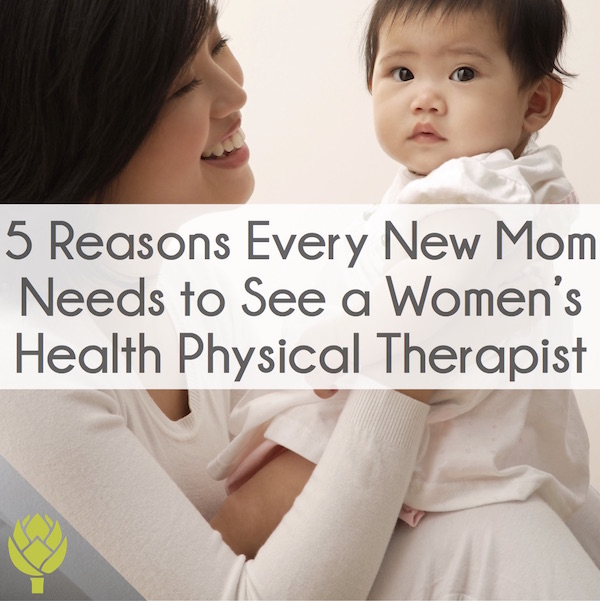It’s safe to say there were a lot of things about pregnancy, birth, postpartum healing, and motherhood that surprised me.
When it came to my postpartum recovery, I made the naive assumption that I’d have an easy time with recovery and return to movement.
Both professionally and personally, I had stacked the deck in my favor. I was a certified Pilates instructor with advanced training in prenatal and postpartum recovery, I had worked directly with mamas at a women’s health physical therapy practice, I was extremely mindful of my body, including my pelvic floor muscle function, and I stayed active (without overextending myself or doing anything that would compromise my pelvic floor health) during my pregnancy.
My logical brain knew that pregnancy and birth would put a strain on my pelvic floor and it would take a while to recover. But the optimist in me felt that my recovery would be quick and easy.
My body was made for pregnancy and birth, right?
Well, even though there was nothing necessarily “wrong” with my birth or my pelvic floor function (I was not leaking urine and I didn’t necessarily think I had prolapse, but wasn’t 100% sure either!), I was surprised how long it took for everything to feel normal again down there.
As I write in the fourth trimester chapter of Real Food for Pregnancy (and share in this postpartum recovery interview on the Startup Pregnant Podcast), I didn’t know at the time that the research shows it often takes a full YEAR for my pelvic floor function to return to baseline. Yes, a full year!
I found that having a full assessment by a women’s health physical therapist helped put my mind at ease. She assured me that everything was healing as expected and that it just takes time (and continued mindfulness on my part). Sometimes when you know too much, you expect the worst. This is why it’s so important to have a professional to turn to!
As if I wasn’t already such a fan of women’s health physical therapists, my experience reinforced my continued support for their role in postpartum recovery. We really need to take a hint from other countries, like France, and make it routine practice for ALL new mothers to be referred to one.
There may be nothing “wrong” and that’s reassuring. Or there may be some things that require continued physical therapy (or possibly a referral to a different specialist). Either way, knowing this will put your mind at ease and help you focus on your best path forward.
Regardless of the way you gave birth, your body has made some incredible adaptations during pregnancy, especially in your pelvic floor. Here are 5 reasons every new mom needs to see a women’s health physical therapist.
The following post is written by Anna Scammell. She’s a master’s-trained Women’s Health Physiotherapist form Australia (depending on where you live, you might refer to her as a Women’s Health Physical Therapist or Pelvic Floor Physical Therapist). Anna is the founder of
The Whole Mother where she combines her 10+ years of clinical experience, evidence based knowledge, and passion for health & well-being to educate, empower & inspire women to be the best version of themselves during their childbearing years.
Without further ado, here’s Anna.
5 Reasons Every New Mom Needs to See a Women’s Health Physical Therapist
1. The Specialty Knowledge of a Women’s Health Physical Therapist is Very Different to an Obstetrician’s
It’s important for all pregnant and postpartum women to understand that the role of a Women’s Health/Pelvic Floor Physical Therapist (or as we call it in Australia, Physiotherapist!) is very different to that of an Obstetrician or other perinatal health providers, such as midwives. You see, to optimize your health during pregnancy and postpartum, you need to be seeing both of us.
As you likely know, it is the responsibility of your perinatal healthcare provider to ensure your baby is healthy throughout your pregnancy and is delivered safely, whilst keeping an eye on your health. As a result, their main focus is the baby. On the other hand, a Women’s Health Physical Therapist is focused on the health and wellbeing of you, the mother. Our mission is to make sure you are educated and empowered with all the information you need to have the best pregnancy, birth and recovery possible.
Our role actually starts when you are pregnant. I always recommend pregnant women to have several sessions with a Women’s Health Physical Therapist (who has postgraduate qualifications) to learn:
- Pelvic floor exercises
- How to exercise safely during pregnancy
- How to prevent and manage pelvic pain
- How to best prepare your body for childbirth
- Early postpartum recovery – so you can optimize your recovery in the first few weeks at home.
After having your baby, the ideal time to have an appointment with a Women’s Health Physical Therapist is 6 weeks postpartum. Regardless of how you gave birth, this is necessary for all women.
2. You Need a Full Assessment of Your Pelvic Floor and Deep Abdominal Muscles
The pelvic floor is one of the areas Women’s Health Physical Therapists specialize in. We do comprehensive pelvic floor assessments via a vaginal examination to assess the strength and state of your pelvic floor following birth.
Commonly, Obstetricians/GPs do not perform vaginal examinations at your 6-week check, so it is up to you to book an appointment with a Women’s Health Physical Therapist to have a pelvic floor assessment. Even if they do perform a vaginal exam, their purpose is not necessarily to check your pelvic floor function, but to see that a tear/episiotomy is healing.
Women’s Health Physical Therapist’s can also use a real-time ultrasound machine to teach you how to activate your deep abdominal muscles (transversus abdominis) postpartum. These muscles work with your pelvic floor muscles to stabilize your spine and pelvis, and are the key to rehabilitating your abdominal muscle separation.
3. You Can Prevent and Manage Common Women’s Health Issues
Since childbirth is a risk factor for developing prolapse and bladder leakage, Women’s Health Physical Therapists help to both prevent and treat these issues. In fact, the evidence shows that pelvic floor exercises during the perinatal period both prevent and treat prolapse and incontinence. This is why they are so important! Since many women (43% in one study*) do a pelvic floor contraction incorrectly, a Women’s Health Physical Therapist will teach you the correct technique.[ref]Thompson, Judith A., and Peter B. O’sullivan. “Levator plate movement during voluntary pelvic floor muscle contraction in subjects with incontinence and prolapse: a cross-sectional study and review.” International Urogynecology Journal 14.2 (2003): 84-88.[/ref]
Another common postpartum issue is painful intercourse (dyspareunia). This can result from perineal injury during childbirth (tear or episiotomy) and the development of scar tissue. Left untreated, the pelvic floor muscles can increase in tension and dyspareunia can often worsen. Painful intercourse is not just something you have to put up with because you birthed a baby; it is both preventable and treatable. Women’s Health Physical Therapists can:
- Teach you how to best prepare your body for childbirth
- Teach you how to best care for your pelvic floor in early postpartum
- Provide treatment to improve scar tissue and muscle tension
- Educate you on self-management strategies
4. You Deserve Individualized Care and Support
Since every body and birth is different, Women’s Health Physical Therapist’s provide individualized education and treatment according to your symptoms and preferences. In the session, we will ensure you feel comfortable to talk about the birth of your baby, and how your pelvic floor, abdominal muscles, bladder and bowel are recovering. We can then ensure we are giving you the best care possible.
We are very aware that motherhood is unknown territory for many women and can be daunting, tiring and emotional. We offer a safe space for you to be completely vulnerable, and talk about any issues you are having, physically and emotionally. Your health and wellbeing is our priority, and we will support you in any way we can.
5. Guidance on the Safe Return to Exercise Postpartum is Key
Returning to exercise after having a baby needs to be done slowly and safely. With social media these days, new moms can feel pressure to look Insta-fit straight after having a baby. But this is completely unrealistic and unsafe! Instead, it’s important to appreciate what your body has just gone through during pregnancy and childbirth, and make decisions that are safe for your pelvic floor and recovery.
Women’s Health Physical Therapist’s will help guide you through what exercise is safe for you according to your birth and recovery. Since every woman has a different birth, recovery, pelvic floor strength, abdominal separation, fitness levels and goals, this is likely to differ from woman to woman. However, there are some general guidelines that should be followed.
For example, prioritizing rest and recovery in the first 6 weeks postpartum, as this is when most of the healing takes place in your body. During this time you can focus on optimal posture, gentle pelvic floor and core muscle activation, stretching, and gentle walking.
With these 5 reasons in mind, my advice to all new moms is to prioritize an appointment with a Women’s Health Physical Therapist. You won’t regret it!
Anna x
For more from Anna, see her website, The Whole Mother, or follow her on Instagram.
Closing Thoughts on Women’s Health Physical Therapy (from Lily)
I know talking about “down there” is taboo and uncomfortable for many, but we really need to break the silence here. Women are suffering because they are not being heard, are not being referred to the right specialists, and are not being given detailed or personalized advice on return to movement.
This ranges from not being given realistic time frames to full recovery, to having a proper pelvic floor examination with specific regards to pelvic floor muscle function, and so much more.
Please, please, speak up to your care providers. Here in the United States, many general healthcare providers are NOT familiar with women’s health physical therapy. It’s wise to ask for a referral at your postpartum check up even if you’re not 100% sure you’ll need it or make use of it.
How to Find a Women’s Health Physical Therapist
If you need help finding a specialist in women’s health/pelvic floor physical therapy, these directories may be helpful:
- American Physical Therapy Association: Section on Women’s Health
- Herman & Wallace Pelvic Rehabilitation Institute
- Association for Pelvic Organ Prolapse Support (this includes links to PTs and other specialists in pelvic floor health, including directories outside of the US)
Break the Silence
Spread the word and pass this vital information on to any new and expecting mamas in your circle. And please, BE BRAVE, and share your story with others, whether that’s in the comments area below or just with a close friend.
Your story matters. You never know who you’ll help by sharing it.
Until next week,
Lily
P.S. – It’s beyond the scope of today’s article, but I also want to remind you that there are nutritional factors that play a role in the recovery of your muscles, connective tissues, and in healing perineal injury or C-section incisions. A BIG player in this are the amino acids glycine and proline, which are found in abundance in the collagen-rich tissues of animal foods (like both broth and slow-cooked, tough cuts of meat). Refer to chapters 3 and 12 of Real Food for Pregnancy for a deep dive into the vital role of these foods in pregnancy and postpartum health. Ideally, preparing for postpartum recovery includes a plan for how you will nourish yourself. My post on real food postpartum recovery meals offers plenty of tips and 50+ recipes, so you can stock your freezer and/or outsource some cooking to friends/family.
You can have a smoother recovery from pregnancy and childbirth; it just takes a higher level of rest, recovery, and nutritional repletion than Western culture acknowledges.
P.P.S. – If you’re looking for a great postpartum exercise and recovery program, be sure to check out the MUTU system (affiliate link). It’s endorsed by PTs worldwide for good reason: it’s safe, effective, and made specifically for new moms recovering from childbirth. If you’re already quite athletic and looking for more guidance around return to lifting or higher intensity exercise, check out the BIRTHFIT program (affiliate link).











Thank you for writing this post. I too have felt nervous about sharing about pelvic floor recovery after birth, but after a rough recovery and months of shame from incontinence, I finally saw a women’s health physical therapist and it was seriously the best $ I’ve spent on my health. Seriously, they are a Godsend and I recommend all new mom friends make an appointment with one.
I think it blindsides people how much it can affect their mental health to have pelvic floor issues. It’s like night and day for me now. I’m so grateful to have recovered function with the help of my PT.
I had a traumatic pregnancy and experienced Symphysis pubis dysfunction.
I found that Doctors and nurses don’t know much about it and almost act as if you are making up your pain situation.
It was finding a physical therapist who specialized in pelvic that I finally felt someone had compassion to where I was at. Not being able to walk and the level of pain and the increase of not being able to do every day movement is beyond scary.
I wish more was done to educate US medical population and women about this condition. It is not as rare as they are making it out to be. Women just aren’t being heard or diagnosed properly
Good article for sure though. Thank you.
I couldn’t agree more. I’m glad you were able to get help with a women’s health PT.
Yes! I’m continually amazed as a nurse the number of women who live with incontinence thinking that it’s normal. It’s not and you don’t have to live with it. I LOVED my pelvic health Physio that I saw after pregnancy and I didn’t have any pelvic floor dysfunction. I would never hesitate to recommend any woman (or man) with pelvic floor issues to see one!
Great post!! I live in Belgium and physiotherapists play a big role during pregnancy, postpartum and even your birth (you can have a physiotherapist during your birth, although is not free). The health insurance give you 18 session after birth whose price is around 80% covered.